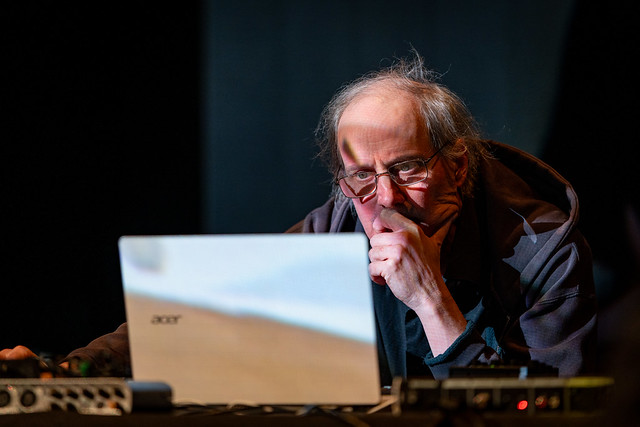
Friday May 24, 2024
Hearing Extremes
- Friday, May 24, 2024
- 5:00pm - 7:00pm Calit2 Auditorium
- Announcement
- Photos
- Video Stream
- RSVP to ideasqi@ucsd.edu
On Friday, May 24, the Qualcomm Institute’s IDEAS series presents “Hearing Extremes” with renowned composer and UC San Diego Professor of Music Lei Liang, and New York City-based new music chamber group loadbang.
“Hearing Extremes” introduces original compositions by UC San Diego graduate students in collaboration with researchers from the university’s Scripps Institution of Oceanography and Jacobs School of Engineering. Through the “Hearing Extremes” seminar, composers and artists work closely with geologist Emily Chin and oceanographer Joshua Jones, to develop interdisciplinary projects outside the walls of their respective departments, to think of the entire campus as a place for “great learning,” to reconsider what each participant’s role might be in regard to the collaboration, and to create works that would not be possible without a fully integrated approach that reflects the knowledge, technology and global issues of our time.
The program features premieres of works by composers Mitchell Carlstrom, Stephen de Filippo, WANG Delong, Gabriel Soberón Nelson, Haihui Zhang, and visual artist Moe Penders Ramos.
Motion Mitchell Carlstrom
Mammalian Dialogue WANG Delong
sun moon | ocean earth Gabriel Soberón Nelson
Shadow III Haihui Zhang
Home Range Moe Penders Ramos
Reading Mantle Petrology Stephen de Filippo
loadbang will perform the students’ pieces for a live audience.
About loadbang
loadbang is building a new kind of music for mixed ensemble of trumpet, trombone, bass clarinet, and baritone voice. Since their founding in 2008, they have been praised as ‘cultivated’ by The New Yorker, ‘an extra-cool new music group’ and ‘exhilarating’ by the Baltimore Sun, ‘inventive’ by the New York Times and called a ‘formidable new-music force‘ by TimeOutNY. Creating ‘a sonic world unlike any other‘ (The Boston Musical Intelligencer), their unique lung-powered instrumentation has provoked diverse responses from composers, resulting in a repertoire comprising an inclusive picture of composition today.
loadbang has premiered more than 500 works, written by members of the ensemble, emerging artists, and today’s leading composers. Their repertoire includes works by Pulitzer Prize winners Raven Chacon, David Lang, and Charles Wuorinen; Rome Prize winners Andy Akiho and Paula Matthusen; and Guggenheim Fellows Chaya Czernowin, George Lewis, and Alex Mincek. They are the ensemble-in-residence at Cornell University through the Steven Stucky Memorial Residency for New Music, and through a partnership with the Longy School of Music of Bard College in Boston, they are the ensemble-in-residence at Divergent Studio, a contemporary music festival for young performers and composers held each summer. Visit loadbang’s website for more.



















